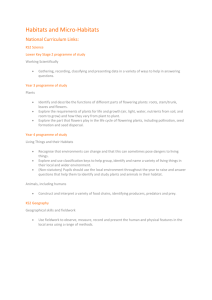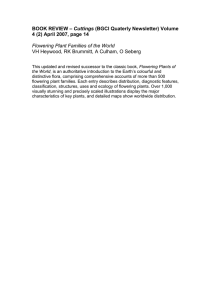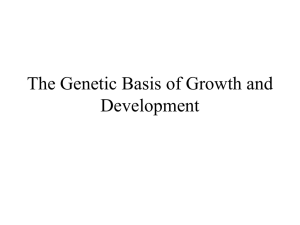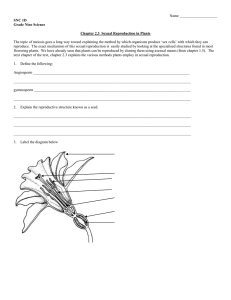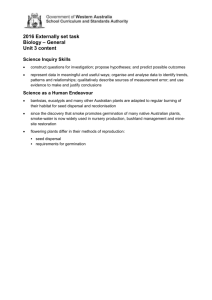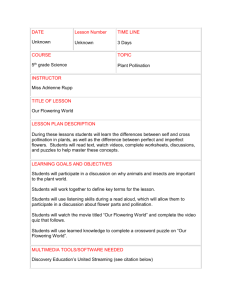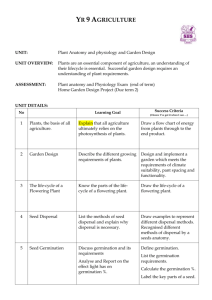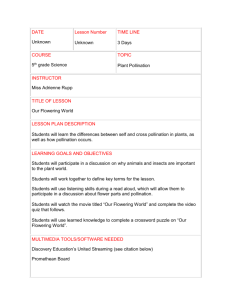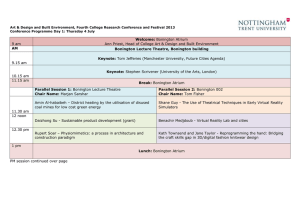Subject Short Term Planning Bonington Junior School
advertisement
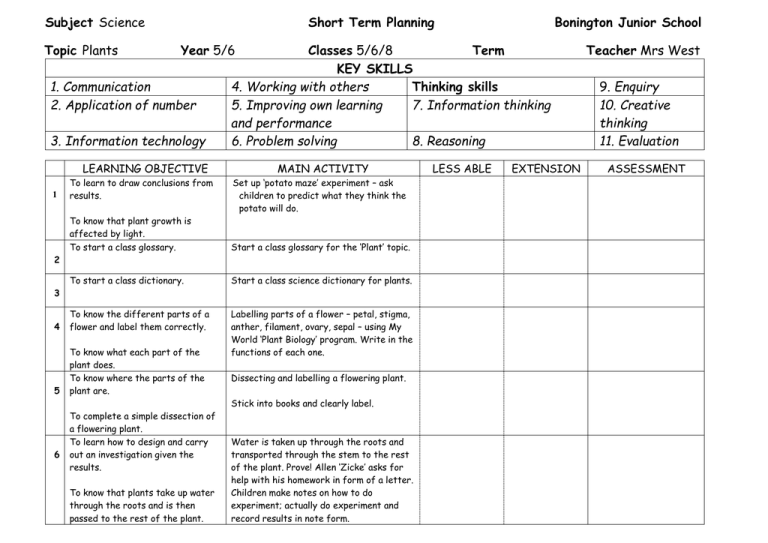
Subject Science Topic Plants Short Term Planning Year 5/6 1. Communication 2. Application of number 3. Information technology LEARNING OBJECTIVE 1 To learn to draw conclusions from results. Classes 5/6/8 Term KEY SKILLS 4. Working with others Thinking skills 5. Improving own learning 7. Information thinking and performance 6. Problem solving 8. Reasoning MAIN ACTIVITY Set up ‘potato maze’ experiment – ask children to predict what they think the potato will do. To know that plant growth is affected by light. To start a class glossary. Start a class glossary for the ‘Plant’ topic. To start a class dictionary. Start a class science dictionary for plants. 4 To know the different parts of a flower and label them correctly. 5 To know what each part of the plant does. To know where the parts of the plant are. Labelling parts of a flower – petal, stigma, anther, filament, ovary, sepal – using My World ‘Plant Biology’ program. Write in the functions of each one. 2 3 Dissecting and labelling a flowering plant. Stick into books and clearly label. 6 Bonington Junior School To complete a simple dissection of a flowering plant. To learn how to design and carry out an investigation given the results. To know that plants take up water through the roots and is then passed to the rest of the plant. Water is taken up through the roots and transported through the stem to the rest of the plant. Prove! Allen ‘Zicke’ asks for help with his homework in form of a letter. Children make notes on how to do experiment; actually do experiment and record results in note form. LESS ABLE EXTENSION Teacher Mrs West 9. Enquiry 10. Creative thinking 11. Evaluation ASSESSMENT Subject Science Topic Plants Short Term Planning Year 5/6 1. Communication 2. Application of number 3. Information technology 7 To learn to record details of an investigation so that it can be repeated 8 To know that plants need light to produce food for growth. 9 To know the importance of leafs in this process. To label process of photosynthesis correctly. 10 To use program correctly. To know that plants need light to survive. To learn to design and carry out an experiment given the results. To learn to experiment and 11 investigate appropriately. To learn that plants will grow on a 12 variety of surfaces, not just soil. Classes 5/6/8 Term KEY SKILLS 4. Working with others Thinking skills 5. Improving own learning 7. Information thinking and performance 6. Problem solving 8. Reasoning Re-present information on how to do experiment and the results that you found. Needs to be clear enough so Zicke could do experiment himself and/or explain it to teacher. Photosynthesis – how does it work? Key words – chlorophyll, food, light, sugar, water, glucose, leaf, carbon dioxide. Complete appropriate section on My World ‘Plant Biology’ program. Plants need light to survive. Prove! Possibility of having a second letter from alien/friend. Notes on how to do experiment, do experiment, notes on results. Write up. Professor Blurb has gone into space for six months to investigate plant growth in space. Has got light, water and plants/seeds. Has forgotten the soil. How could he still grow his plants? Notes, have-a-go, record in the form of a poster – revolutionary plant growing techniques. Assessment activity. Bonington Junior School Teacher Mrs West 9. Enquiry 10. Creative thinking 11. Evaluation Subject Science Topic Plants Short Term Planning Year 5/6 1. Communication 2. Application of number 3. Information technology 13 14 15 16 17 To learn about the life cycle of a flowering plant – pollination, seed production, dispersal and germination. To learn how to use a key and a decision tree to classify. To understand that different plants are found and are suited to different habitats. To understand reasons for a plant being suited to its habitat. To know that food chains show the feeding relationships To know that a food chain starts with a green plant. To understand that the microorganism is not visible to the naked eye. To understand that some microorganisms may be beneficial and some harmful. Classes 5/6/8 Term KEY SKILLS 4. Working with others Thinking skills 5. Improving own learning 7. Information thinking and performance 6. Problem solving 8. Reasoning Life cycles of flowering plants – pollination, seed production, seed dispersal, germination. Look at different ways these happen and what is involved. Classification – using keys and/or decision trees. Sorting and classifying (a) leaves (b) flowering plants Label plants to be classified as A, B, C, D etc Habitats and adaptation – compare pond life, woodland, urban, marsh, etc. use quadrants to compare different plants growing in each. Food chains – role-play – cards of different plants/creatures – put themselves into appropriate places in food chains. What would happen to an ecosystem if there were no green plants? Microorganisms – examples of useful/harmless and harmful microorganisms. Size of micro-organisms (i.e. Not visible to the naked eye) Bonington Junior School Teacher Mrs West 9. Enquiry 10. Creative thinking 11. Evaluation
